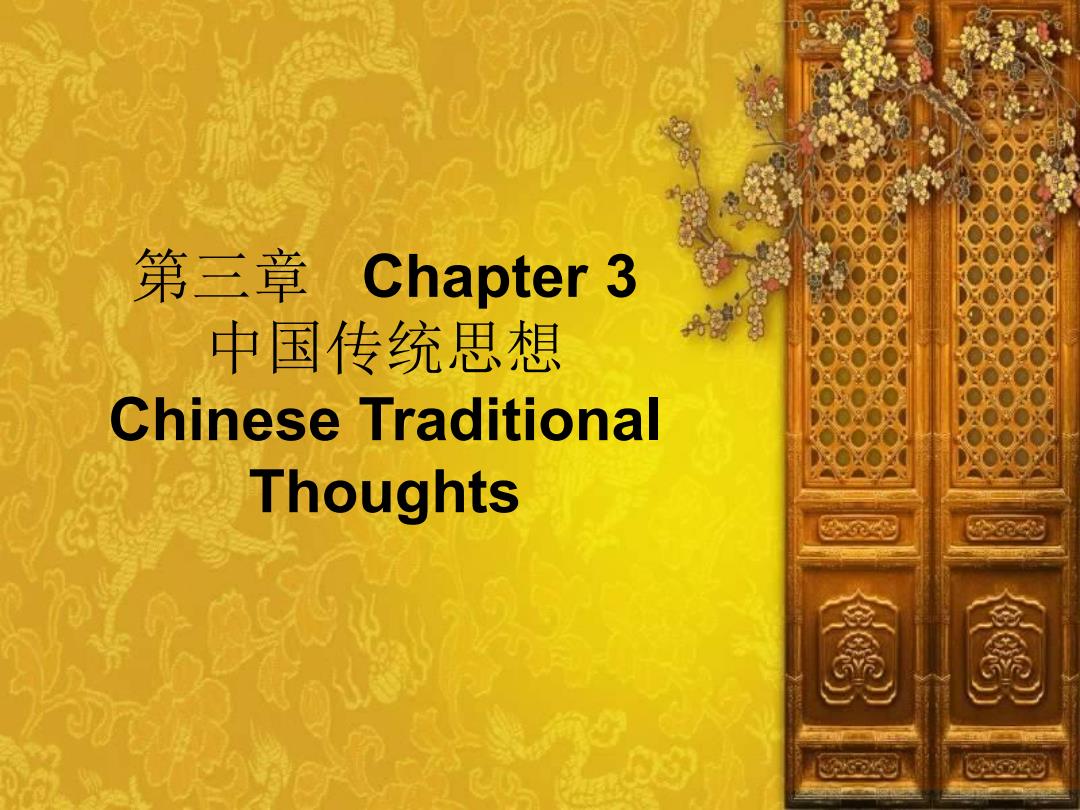
第三章Chapter3 中国传统思想 Chinese Traditional Thoughts 8
第三章 Chapter 3 中国传统思想 Chinese Traditional Thoughts

内容提要 Essentials >1.中国历代重要的思想家 Chinese Key Philosophers Through the Ages >2.中国传统思想的继承与革新 Inheritance and Innovation of Chinese Traditional Thoughts >3.传统思想对中国社会及中国人的影响 Influences of Traditional Thoughts upon Chinese Society and Chinese People
内容提要 Essentials 1. 中国历代重要的思想家 Chinese Key Philosophers Through the Ages 2. 中国传统思想的继承与革新 Inheritance and Innovation of Chinese Traditional Thoughts 3. 传统思想对中国社会及中国人的影响 Influences of Traditional Thoughts upon Chinese Society and Chinese People
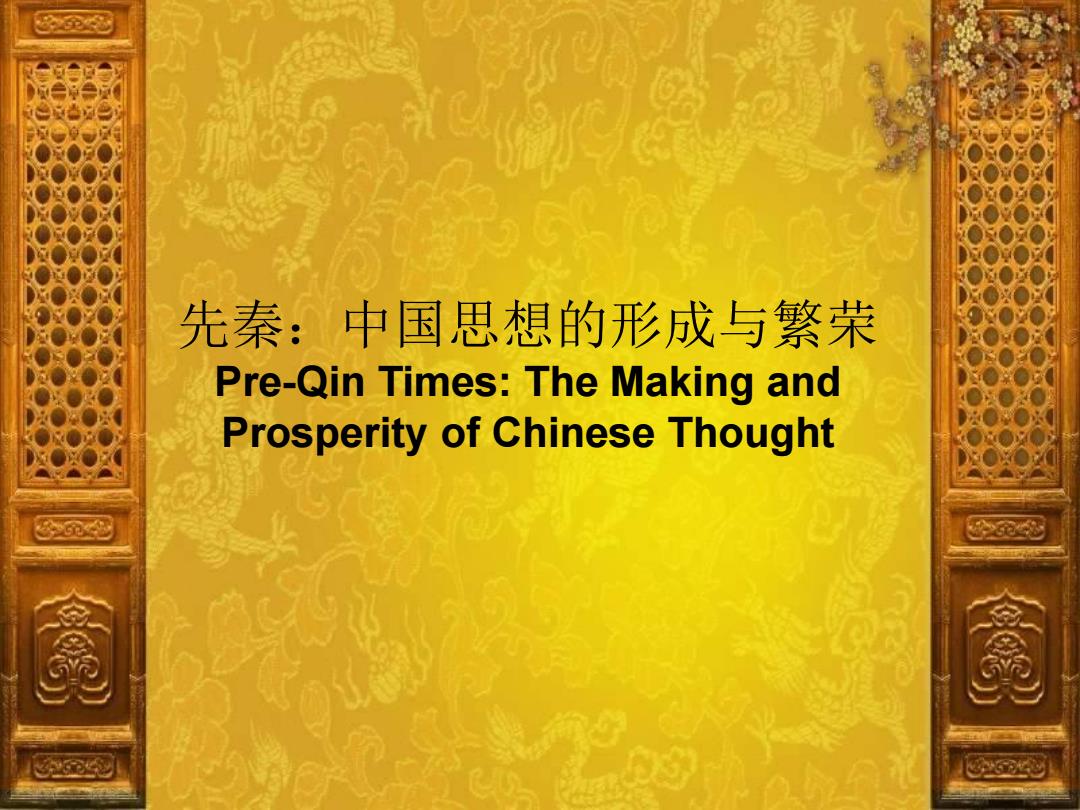
全 先秦:中国思想的形成与繁荣 Pre-Qin Times:The Making and Prosperity of Chinese Thought 窗
先秦:中国思想的形成与繁荣 Pre-Qin Times: The Making and Prosperity of Chinese Thought

读前思考Pre-reading Questions 1.孔子为中国古代思想和教育作出了哪些贡献? What contributions did Confucius make to Chinese ancient thought and education? 2. 除了孔子之外,你还了解哪些著名的中国古代思想家? 他们各自生活在什么样的时代,主要的思想分别是什 么?他们对中国思想的发展和繁荣产生了哪些影响? Besides Confucius,do you know any other famous ancient Chinese philosophers?What epoch they lived respectively in,and what was their main ideas?What influences did they bring forth to the development and prosperity of Chinese thoughts?
读前思考 Pre-reading Questions 1. 孔子为中国古代思想和教育作出了哪些贡献? What contributions did Confucius make to Chinese ancient thought and education? 2. 除了孔子之外,你还了解哪些著名的中国古代思想家? 他们各自生活在什么样的时代,主要的思想分别是什 么?他们对中国思想的发展和繁荣产生了哪些影响? Besides Confucius, do you know any other famous ancient Chinese philosophers? What epoch they lived respectively in, and what was their main ideas? What influences did they bring forth to the development and prosperity of Chinese thoughts?
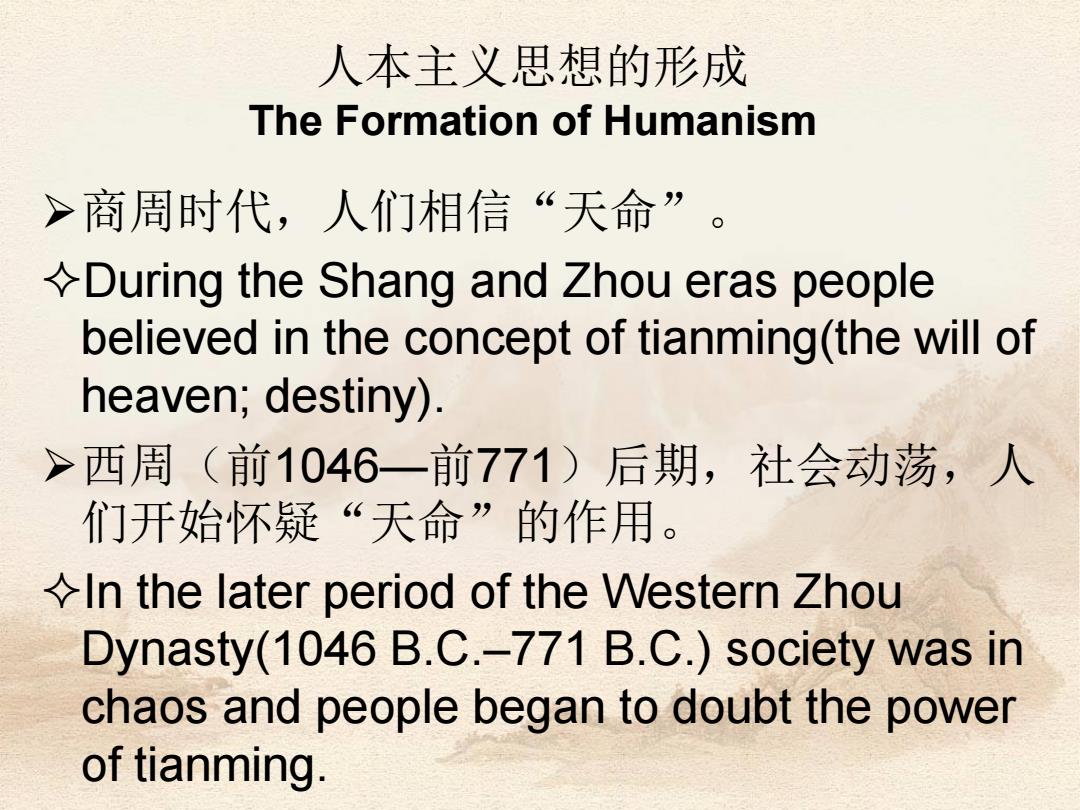
人本主义思想的形成 The Formation of Humanism >商周时代,人们相信“天命”。 During the Shang and Zhou eras people believed in the concept of tianming(the will of heaven;destiny). >西周(前1046一前771)后期,社会动荡,人 们开始怀疑“天命”的作用。 In the later period of the Western Zhou Dynasty(1046 B.C.-771 B.C.)society was in chaos and people began to doubt the power of tianming
人本主义思想的形成 The Formation of Humanism 商周时代,人们相信“天命”。 During the Shang and Zhou eras people believed in the concept of tianming(the will of heaven; destiny). 西周(前1046—前771)后期,社会动荡,人 们开始怀疑“天命”的作用。 In the later period of the Western Zhou Dynasty(1046 B.C.–771 B.C.) society was in chaos and people began to doubt the power of tianming
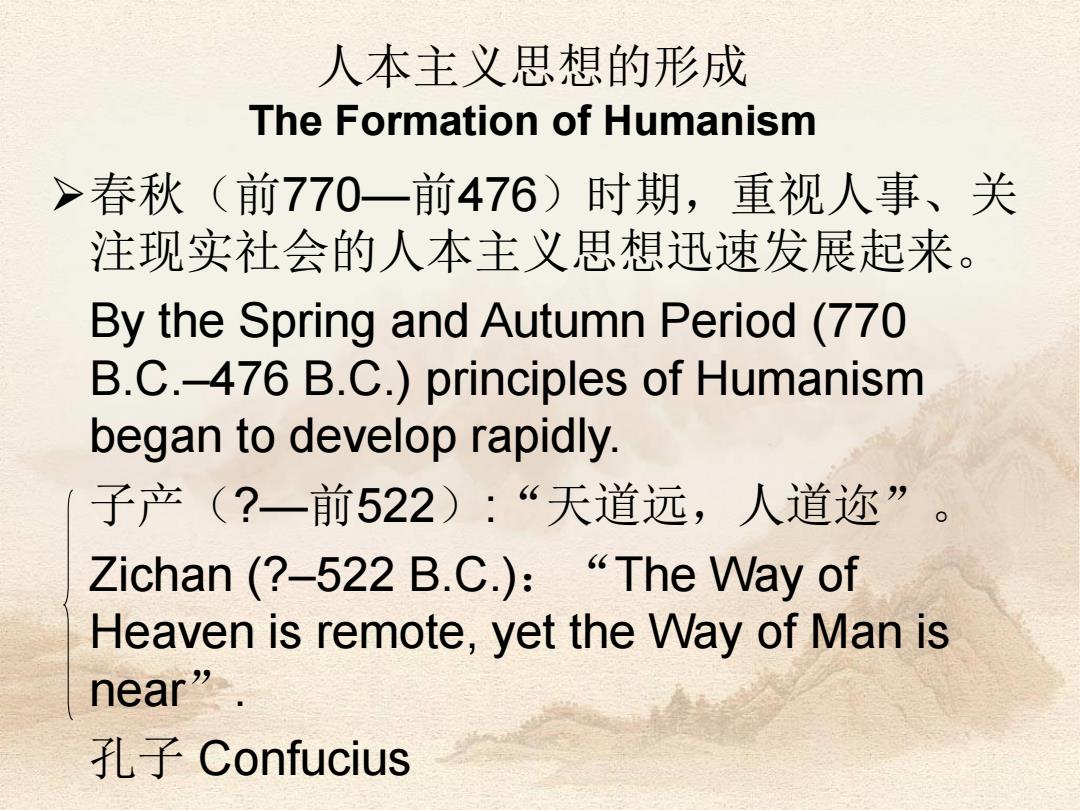
人本主义思想的形成 The Formation of Humanism >春秋(前770一前476)时期,重视人事、关 注现实社会的人本主义思想迅速发展起来。 By the Spring and Autumn Period (770 B.C.-476 B.C.)principles of Humanism began to develop rapidly. 子产(?一前522):“天道远,人道迩”。 Zichan(?-522 B.C.):"The Way of Heaven is remote,yet the Way of Man is near" 孔子Confucius
人本主义思想的形成 The Formation of Humanism 春秋(前770—前476)时期,重视人事、关 注现实社会的人本主义思想迅速发展起来。 By the Spring and Autumn Period (770 B.C.–476 B.C.) principles of Humanism began to develop rapidly. 子产(?—前522):“天道远,人道迩”。 Zichan (?–522 B.C.):“The Way of Heaven is remote, yet the Way of Man is near”. 孔子 Confucius
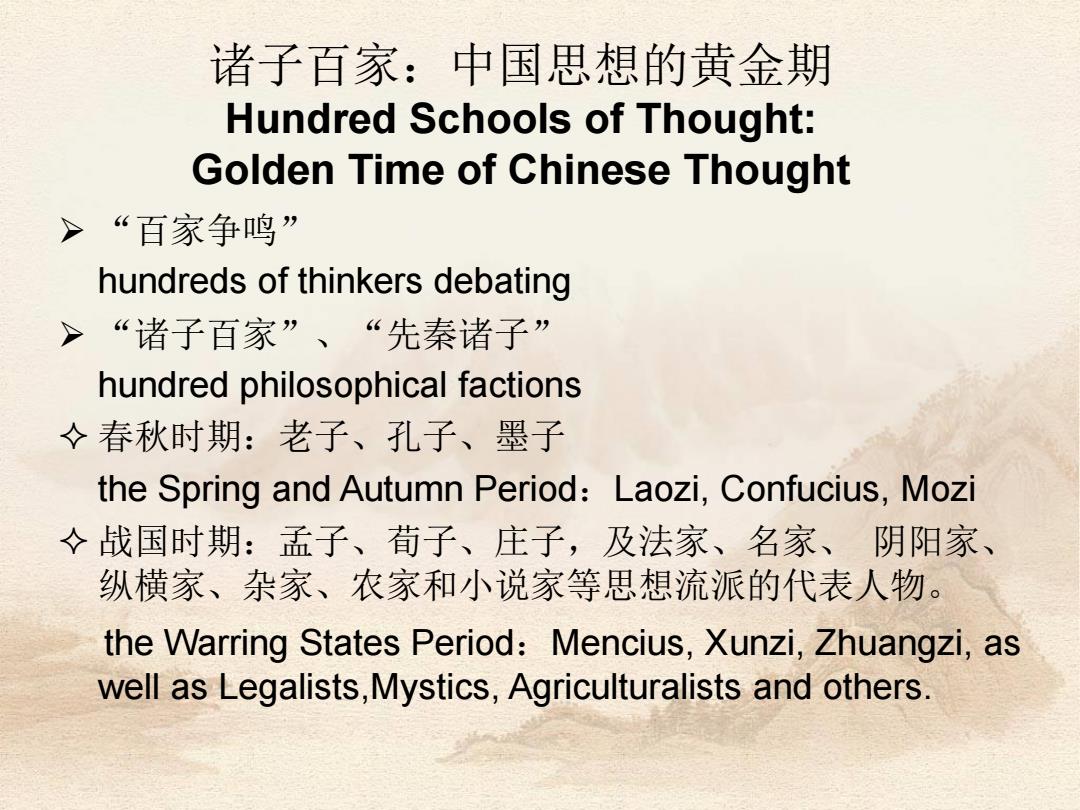
诸子百家:中国思想的黄金期 Hundred Schools of Thought: Golden Time of Chinese Thought “百家争鸣” hundreds of thinkers debating > “诸子百家”、“先秦诸子” hundred philosophical factions ◇春秋时期:老子、孔子、墨子 the Spring and Autumn Period:Laozi,Confucius,Mozi ◇战国时期:孟子、荀子、庄子,及法家、名家、阴阳家、 纵横家、杂家、农家和小说家等思想流派的代表人物。 the Warring States Period:Mencius,Xunzi,Zhuangzi,as well as Legalists,Mystics,Agriculturalists and others
诸子百家:中国思想的黄金期 Hundred Schools of Thought: Golden Time of Chinese Thought “百家争鸣” hundreds of thinkers debating “诸子百家”、“先秦诸子” hundred philosophical factions 春秋时期:老子、孔子、墨子 the Spring and Autumn Period:Laozi, Confucius, Mozi 战国时期:孟子、荀子、庄子,及法家、名家、 阴阳家、 纵横家、杂家、农家和小说家等思想流派的代表人物。 the Warring States Period:Mencius, Xunzi, Zhuangzi, as well as Legalists,Mystics, Agriculturalists and others
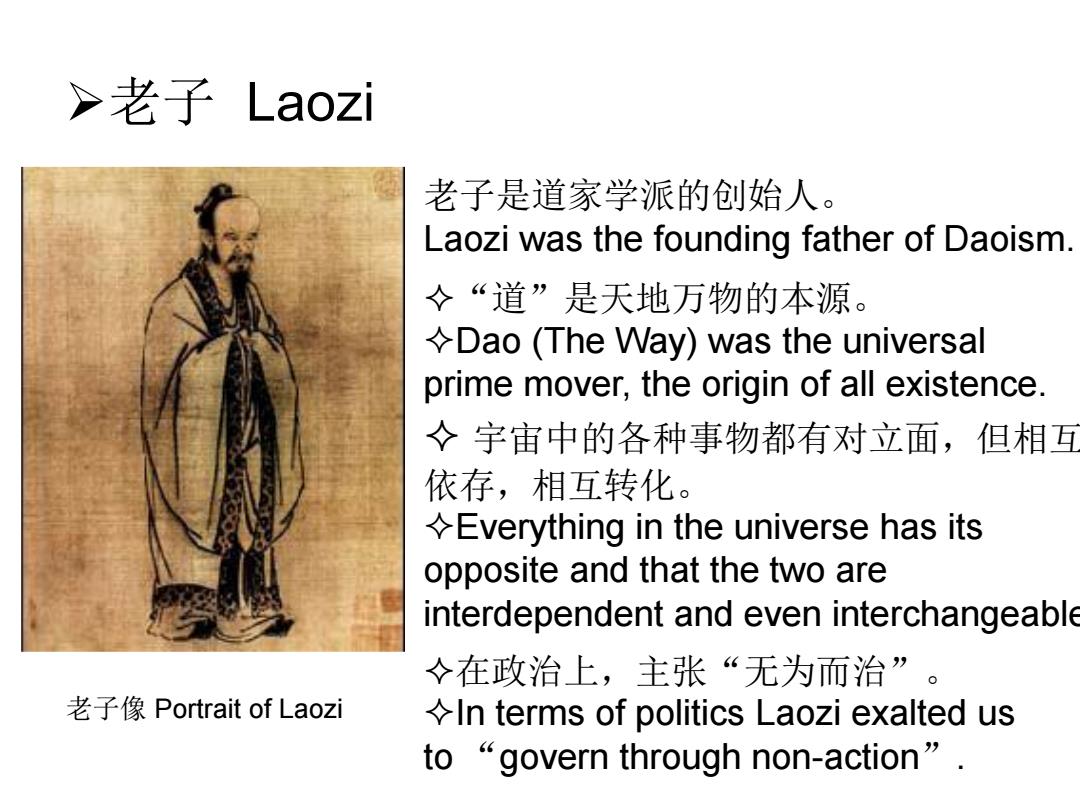
>老子Laozi 老子是道家学派的创始人。 Laozi was the founding father of Daoism 令“道”是天地万物的本源。 Dao (The Way)was the universal prime mover,the origin of all existence. ◇宇宙中的各种事物都有对立面,但相互 依存,相互转化。 Everything in the universe has its opposite and that the two are interdependent and even interchangeable ◇在政治上,主张“无为而治”。 老子像Portrait of Laozi In terms of politics Laozi exalted us to“govern through non-action
老子 Laozi 老子像 Portrait of Laozi “道”是天地万物的本源。 Dao (The Way) was the universal prime mover, the origin of all existence. 宇宙中的各种事物都有对立面,但相互 依存,相互转化。 Everything in the universe has its opposite and that the two are interdependent and even interchangeable. 在政治上,主张“无为而治”。 In terms of politics Laozi exalted us to “govern through non-action”. 老子是道家学派的创始人。 Laozi was the founding father of Daoism
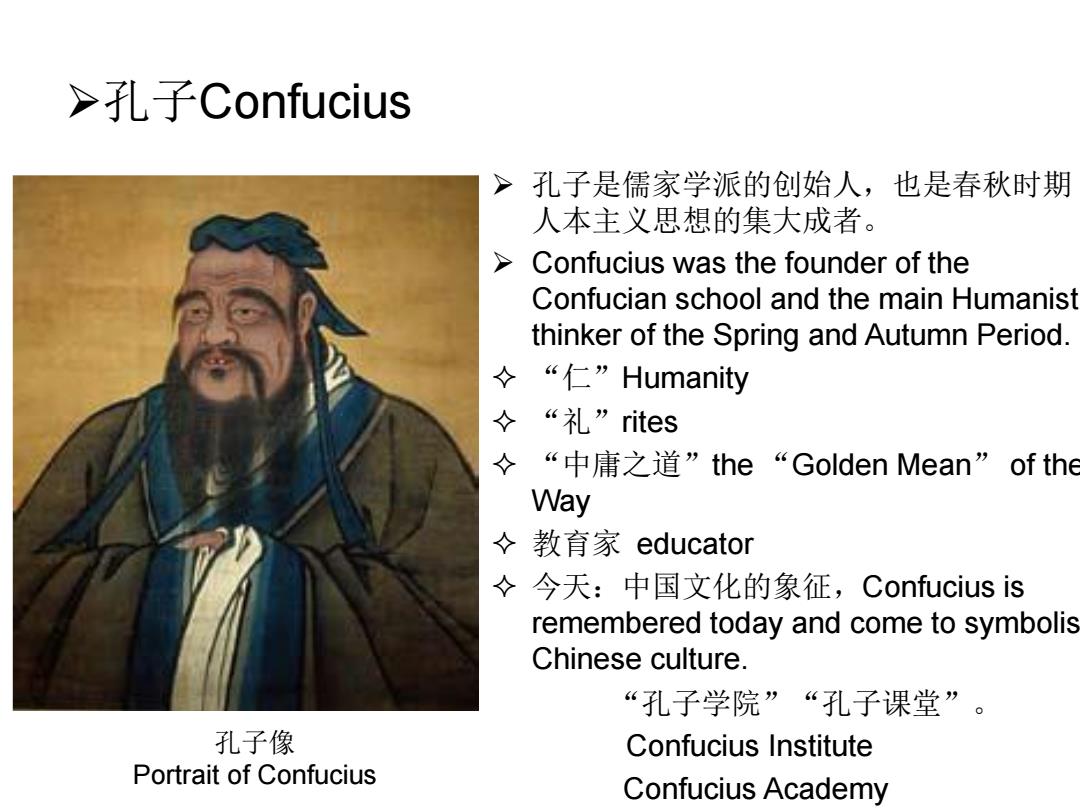
>孔子Confucius 孔子是儒家学派的创始人,也是春秋时期 人本主义思想的集大成者。 Confucius was the founder of the Confucian school and the main Humanist thinker of the Spring and Autumn Period. 令“仁”Humanity ◇ “礼”rites “中庸之道”the“Golden Mean”of the Way ◇教育家educator 令今天:中国文化的象征,Confucius is remembered today and come to symbolis Chinese culture. “孔子学院”“孔子课堂”。 孔子像 Confucius Institute Portrait of Confucius Confucius Academy
孔子Confucius 孔子是儒家学派的创始人,也是春秋时期 人本主义思想的集大成者。 Confucius was the founder of the Confucian school and the main Humanist thinker of the Spring and Autumn Period. “仁”Humanity “礼”rites “中庸之道”the “Golden Mean” of the Way 教育家 educator 今天:中国文化的象征,Confucius is remembered today and come to symbolise Chinese culture. “孔子学院”“孔子课堂”。 Confucius Institute Confucius Academy 孔子像 Portrait of Confucius
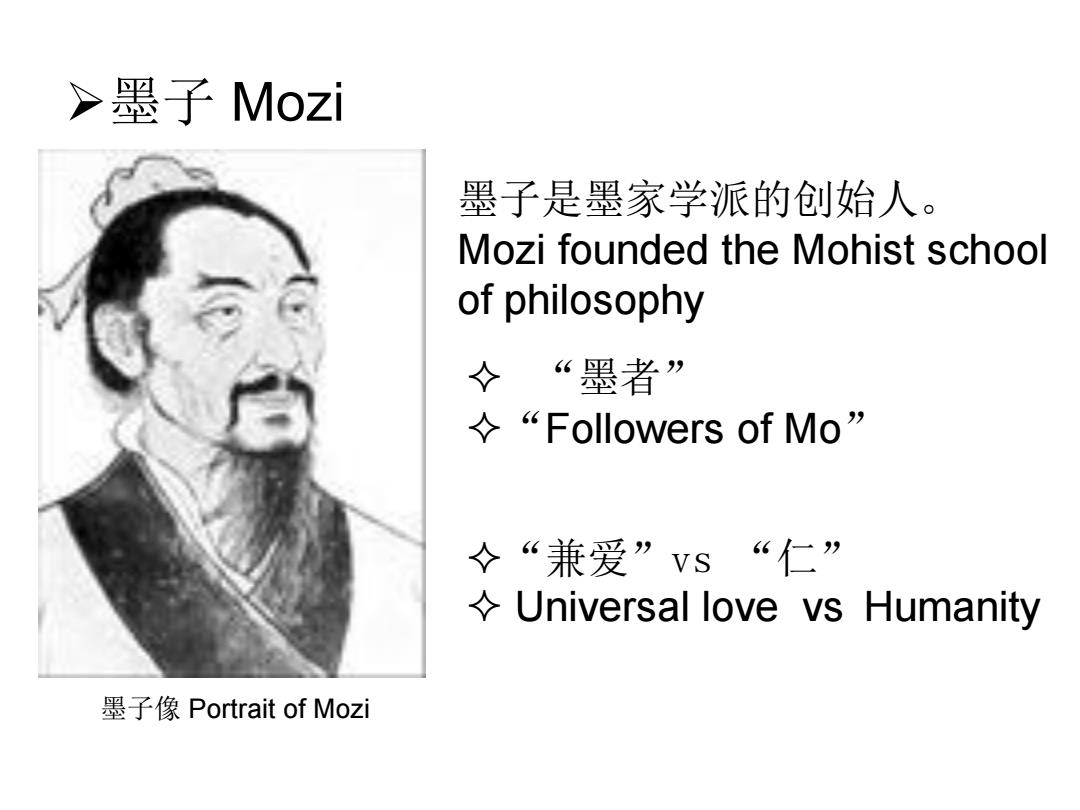
>墨子Mozi 墨子是墨家学派的创始人。 Mozi founded the Mohist school of philosophy ◇ “墨者” “Followers of Mo” ◇“兼爱”vS“仁” Universal love vs Humanity 墨子像Portrait of Mozi
墨子 Mozi 墨子像 Portrait of Mozi “墨者” “Followers of Mo” “兼爱”vs “仁” Universal love vs Humanity 墨子是墨家学派的创始人。 Mozi founded the Mohist school of philosophy